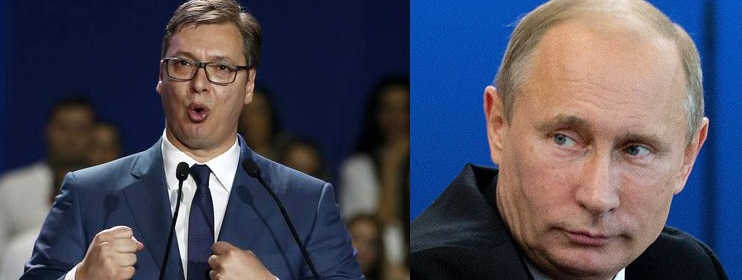After meeting French Front National leader Marine Le Pen in Moscow, it was the turn of Aleksandar Vucic, the current Serbian prime minister who served as a minister under Serbian leader Slobodan Milosevic in the 1990s.
Vucic looks set to sweep a first round presidential election after Sunday’s vote, with 56 percent of the ballots cast, according to a result projection by the Ipsos polling group.
Declaring his victory early, Vucic said he would remain prime minister for another two months, until he takes over as the head of state. Vuvic has expressed his intention to boost economic and military ties with Russia.
Le Pen was given the presidential treatment from the Kremlin, but the Russian president’s support for Vucic was explicit.
Putin welcomed his guest, saying he was certain that Russia-Serbia relations would continue to develop “positively”.
“We really want to discuss with you the situation in the region,” he added, “because . . . we see a certain deterioration.”
Globalist powers are worried about the future of the Balkan states in the NATO military alliance, especially Montenegro and Macedonia. Moscow has accused globalists of plotting to carve up the country to help create a “Greater Albania”.
Russia on the other hand has expressed concern over Kosovo, with whom Serbia teetered “on the brink of conflict” in January during a dispute over a controversial train service.
Belgrade was opposed to Kosovo’s 2008 declaration of independence from Serbia, which came nine years after NATO bombing ended Milosevic’s crackdown on an Albanian insurgency.
Most Serbs are still strongly opposed to membership of NATO – a feeling Vucic exploited to mark 18 years since the start of the bombing campaign.
“Serbia is now stronger than it was in the past years and decades,” Vucic said at a commemoration on Friday. “It will never again suffer aggression from which it will not emerge victorious.”
But Vucic insisted during a visit to German chancellor Merkel that Serbia was doing its utmost to promote peace and stability in the Balkans, and would continue to do so with the help of EU states.
Former German chancellor Gerhard Schröder, currently chairman of a Russian gas company, attended a major Vucic campaign rally, as did Pyotr Tolstoy, the deputy speaker of Russia’s lower house of parliament.
“Today, the European Union is reminiscent of the Soviet Union nearing its collapse, when not a single decision could be made without consulting the supreme authorities . . . until now, they have not offered the world anything except consumer society and protection for the LGBT community,” Tolstoy said.
Recalling NATO’s carpet bombing in 1999, he asked Serbia to forgive Russia for not being strong enough to come to their aid then.
“But now there is a different Russia in the world, and a different Serbia,” said Tolstoy. “It annoys them. They take what is happening in Syria and Ukraine particularly badly,” he added.
“But Russia is returning to the global arena, and they will have to live with it.”
Although the office of president is largely ceremonial, analysts expect Vucic to maintain a hold on power by appointing a loyal ally from his party to succeed him as prime minister.
Vucic is said to have taken control over Serbia’s media. The State Election Commission meanwhile said they have recorded no serious voting irregularities.













No comments.
By submitting a comment you grant Free West Media a perpetual license to reproduce your words and name/web site in attribution. Inappropriate and irrelevant comments will be removed at an admin’s discretion. Your email is used for verification purposes only, it will never be shared.